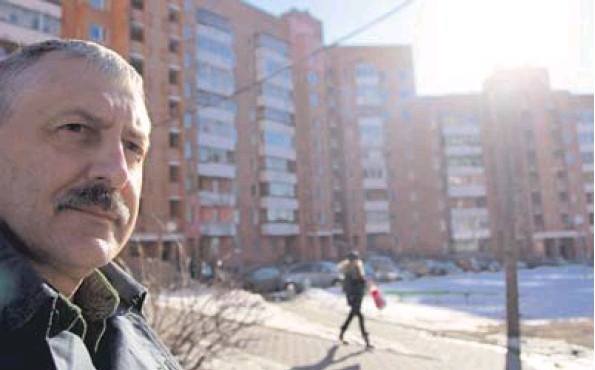International Herald Tribune: Soviet- era echoes in punishment for Belarus family
Andrei Vilkin has long been celebrated in Belarus for his skills as a karate master and a coach. The patriarch of a family of decorated martial artists, he has filled his living room with the hallmarks of his success: trophies from world championships and national awards for ‘‘ service to the motherland.’’ But they are of little help to him now. The authoritarian government of this former Soviet republic has branded Mr. Vilkins and his family ‘‘ enemies of the people,’’ a phrase dating from Stalin-era purges. Their crime? Taking part in protests against the widely suspected fraud in the re-election of the president, Aleksandr G. Lukashenko.
Mr. Vilkin, his wife, Svetlana, and their 21-year-old son, Aleksei, were among thousands of people who gathered on a central square in Minsk right after the election in December. The police responded violently, corralling them and hundreds of others into vans and shuttling them to prison.
A judge summarily sentenced Mr. Vilkin and his son to roughly two weeks in jail for participating in an illegal rally and, bizarrely enough, for chanting ‘‘ Long live Belarus!’’ Mrs. Vilkin was detained overnight, fined and released.
The arrests, however, were only the first of their troubles.
The secret police, still known as the K. G. B., first moved against opposition leaders and their supporters. Some have been tried and sent to prison for as long as four years. But now, the crackdown has spread to people who had previously been strangers to politics, like the Vilkins, who dared to voice their anger at the government.
‘‘ The authorities have realized that they can survive now only through provocations and total oppression,’’ said Inna Kuley, the head of Solidarity, a Belarussian rights group.
Dozens of people who took part in the protests have been fired from jobs or kicked out of universities, according to rights groups. The government has disbarred at least five lawyers representing jailed opposition leaders.
A large measure of the government’s control comes from its near monopoly on employment and education, Ms. Kuley said. In exchange for jobs and free education, Mr. Lukashenko demands loyalty. Few have much choice. Within the Soviet-style economy of Belarus, private sector jobs are scarce, as are independent universities.
Events abroad may also be contributing to the crackdown. Mr. Lukashenko, often referred to as the last dictator in Europe, has made clear that he will smother attempts to organize the kind of uprisings that have occurred recently in North Africa and the Middle East.
‘‘ If there arose a real threat of coup in our country, a threat to our 10 million people,’’ Mr. Lukashenko said on a visit to a military base last month, ‘‘ I would not hesitate to use the armed forces.’’
Upon release from prison, the Vilkins found their lives upended. Mr. andMrs. Vilkin, both martial arts instructors at a university, were deemed a poor influence on young people and forced to resign. They have been barred from their specially built workout center at the university and have nowhere to conduct private lessons.
Mr. Vilkin, 52, said he worried that his son could be thrown out of college and drafted into the army. More than a dozen students arrested at the protest have been expelled, rights groups said.
‘‘ You have to remain loyal,’’ Mr. Vilkin said, slouched over a cup of tea at his kitchen table. ‘‘ We violated this rule, and are now out of the game.’’
Mr. Lukashenko has described people like the Vilkins as both traitors and pawns in a Western-backed plot to oust him.
After being arrested, Mr. Vilkin spent Christmas, New Year and his 52nd birthday at a high security prison in the town of Zhodino, where he said he was at times beaten and verbally abused by guards. He said he did not fight back.
He said he and his fellow prisoners from the protest amused themselves with a chess set made of black and white bread, until a guard discovered it and threw it away.
Asked about his prospects now, Mr. Vilkin sighs: ‘‘ Let’s not discuss it, O. K.? I haven’t been able to find decent work in Belarus, yet.’’
Fyodor Panteleenko, an assistant rector at the university, said he knew little about the case, but said that it was Mr. Vilkin’s ‘‘ right’’ to resign if he so chose.
Like many who gathered in December for the demonstration, Mr. Vilkin and his family had never protested before. They did not have ties to opposition groups.
As president for the past 16 years, Mr. Lukashenko seems to have modeled his country on the defunct Soviet Union itself, complete with collective farms and five-year plans, largely obsolete factories and the pervasive K. G. B.
Supporters credit him with staving off the aftershocks of the Soviet collapse, including the runaway corruption, political instability and economic disarray that have plagued neighbors like Ukraine.
But many have begun to view the stability as stagnation. To the west, Belarus borders the European Union — Poland, Latvia and Lithuania— and people look upon those neighbors with envy.
‘‘ We were born in this country and we really love it,’’ Mr. Vilkin said. ‘‘ And we think that it is worthy of a higher standard of living and development than it has. For this, there needs to be some kind of change.’’


















